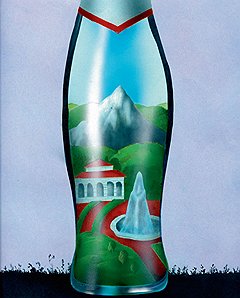 |
| Illustration: Kommersant.ru |
As for the Russian market, "the place of banned Georgian wine has long been occupied by competitors from other countries, while, how surprising it would be, no one has replaced "Borjomi",- the author of the article notes.
The Russian edition recalls the official reasons for embargo, in particular the federation's Chief Doctor, Gennady Onishenko’s statement that "Borjomi" and wine quality did not meet sanitary standards. The journalist assesses, there is a deal of truth in Onishenko’s words and the Georgian side recognizes this problem in regard of wine.
"Version of the wine, especially of the water quality problems, didn’t sound so convincing from the beginning, however, events confirmed the political background in the acts of the Chief Sanitary.
Note: Along with Georgian, Moldovan wines were banned with the same motive. But a year and a half later, Moldova declared it had worked seriously on quality of wine and the supply restored.
Georgia conducted the same work. For example, after investigation 7 Georgian wineries were closed... However, political relations deteriorated. At the beginning Georgia vetoed Russia’s affiliation into WTO, and then it was 2008 - the Russian - Georgian armed conflict, and as a result, Georgian winemakers didn’t get an invitation to return to the Russian market, "- says the author, adding that the Georgian economy resisted this blow.
Publication says that before 2006 Russia occupied approximately 20% in structure of Georgian products export and the lion's share of these products came on wine and mineral water. However, thanks to the government's economic policy, export volume has not decreased since the ban, on the contrary, grew from year to year: in 2005 it amounted to 865.5 million USD, in 2006 - exceeded 900 million, in 2011 totaled 2.2 billion. However, as Russian "Kommersant" points out the flow reduced the Georgian drinks share to 4.6% and ferroalloys, light metals and automobiles, as well as electricity have become major export goods.
Total export of wine and water makes 102 million USD, the figure is equal to the pre-embargo and this is mainly due to mineral water. The publication names "Borjomi” a major player of this market, which the journalist says, only won from prohibiting - the company's production and revenues have increased by one third since that period.
Most of all, "Kommersant" says suffered the Georgian winemakers because the Russian market occupied 80% in their export list. The total rate of wine export was cut in half in 2007, many of the small winemakers, who exported their products to Russia, went bankrupt. «The government's actions that tried to survive the field by all means should be mentioned. First of all, taxes were cut for winemakers. The order came at the end of 2006, which gave wine companies the right not to pay income tax if it was confirmed that profit decreased at least by 50% compared with previous years.
They say the CIS - countries remained the key markets - mainly Ukraine. As for "Borjomi", Russian edition assesses that Georgia should thank Russia for embargo, because after the ban “IDS Borjomi International” sales have increased significantly. But "Kommersant" also noted an interesting nuance and writes that in Georgia "Borjomi" is less drunk, and the best selling water here is "Nabeglavi".
In addition, the publication reports, “IDS Borjomi” is not going to forget the Russian market and 16 % of its products are sold just here.
“Borjomi" reaches Russia by contraband channels and through Belarus which has signed a customs union with Russia. In addition, after the Russian embargo "Borjomi" launched a serious activity in Ukraine, the Baltic States, Kazakhstan, European and American markets. Last summer the "Trade Sanitary Inspection" announced that it would consider the return of Georgian mineral water to the Russian market. This has happened after Georgia finally agreed to let Russia into the World Trade Organization.
However, Georgian wine makers are in no hurry to rejoice. The point is that nobody is waiting for Georgian wine to the Russian market. Their niche was taken by Argentinean, Chilean and other countries of "New World". While "Borjomi" niche, and it’s a paradox, despite the 6 - year break, has been left blank in the Russian market.
According to the author, “Sarajishvili” is also fighting to return to the Russian market, the company’ head notes that his company settled all the formality with the Russian side, and like “Borjomi”, the company will soon get a permission to enter the products in Russia. However, the publication was not so impressed when heard Gennady Onishenko’s words. The Russian Federation's Chief Sanitary Officer told the media the following:
“Indeed, we confirm that we were talking about. Negotiated with "Borjomi" representatives regarding the company’s return... "However, after this optimistic statement Onishenko said that Russian experts had to arrive in Georgia to be convinced in the normal functioning of the sources, etc. But Georgia doesn’t give them security official guarantees. "The main enemy of business in this quasi-state is its own government," - so ended his speech Gennady Onishenko.
Source



No comments:
Post a Comment